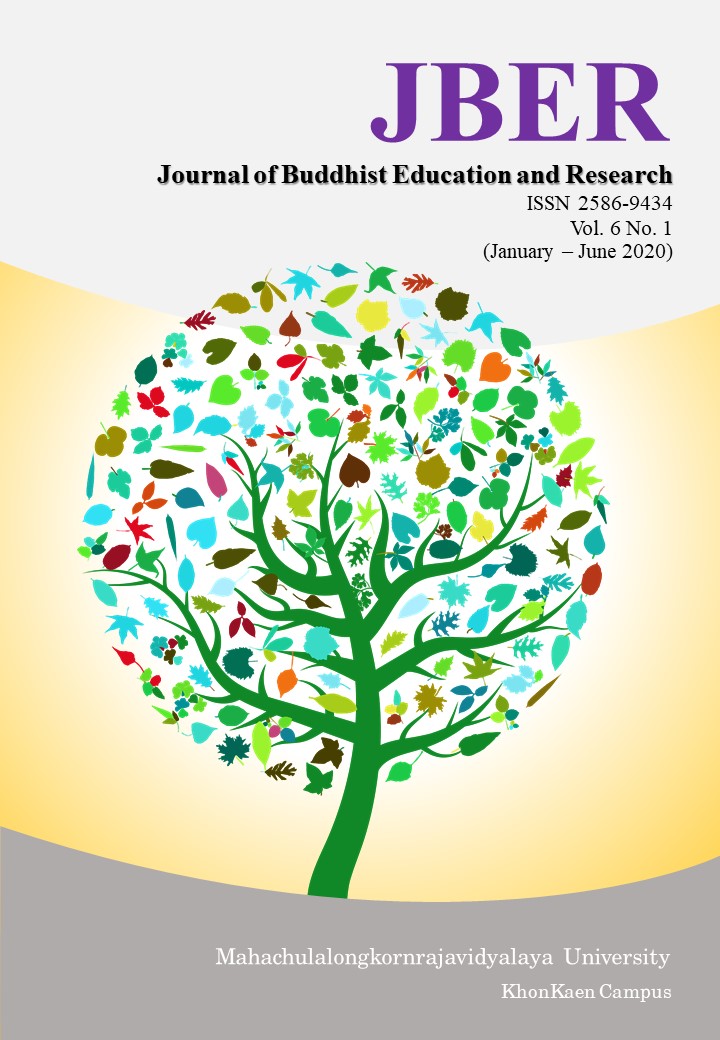THE LEARNING MANAGEMENT MODEL ACCORDING TO THE BUDDHIST WAY OF TEACHERS IN SOCIAL STUDIES RELIGION AND CULTURE UNDER SECONDARY EDUCATION SERVICE AREA OFFICE 19
Keywords:
Model of Learning Management , Buddhist Principles of TeachersAbstract
The aims of this research were: 1) to study the condition of learning management; 2) to study the model of learning management according to the Buddhist principles; 3) to propose the model of learning management according to the Buddhist principles in a learning section of social studies, religion and culture under the Secondary Educational Service Area Office 19. This study was carried out by means of both quantitative and qualitative research methodologies. The sample group used in the research included 169 teachers in the learning section of social studies, religion and culture. The research instruments were the structured interview form and the questionnaires. The statistics used in data analysis were: Frequency, Percentage and Standard Deviation and Multiple Linear Regression. The qualitative data analysis was used to analyze the obtained contents.
The research results were as follows:
1) The teachers in the learning section of social studies, religion and culture under the Secondary Educational Service Area Office 19, mostly are female, accounting for 69.8%, aged less than 30 years, 48.5%, having a bachelor's degree or equivalent, 90.5% and having work experience between 5-10 years, 39.1%.
2) The sample’s opinion towards the model of learning management according to the Buddhist principles in a learning section of social studies, religion and culture under the Secondary Educational Service Area Office 19 was statistically rated at a high level.
3) The analysis of factors influencing the model of learning management according to the Buddhist principles in a learning section of social studies, religion and culture under the Secondary Educational Service Area Office 19 found the influential factors are Buddhist factors variable in the curriculum, factors of Buddhist methods in teaching and learning management, factors of Buddhist methods in using instructional media, Buddhist factors in organizing student development activities and Buddhist factors in evaluation and evaluation.
4) The model of learning management according to the Buddhist principles in a learning section of social studies, religion and culture under the Secondary Educational Service Area Office 19 begins with teachers taking five aspects of learning management based on Buddhist principles: Buddhist factors variable in the curriculum, factors of Buddhist methods in teaching and learning management, factors of Buddhist methods in using instructional media, Buddhist factors in organizing student development activities and Buddhist factors in evaluation and evaluation to apply in the learning management by focusing on the participation of those involved, especially students in order to achieve good results with students according to the criteria for assessing the desirable behavior of students in accordance with the National Education Act (2562 B.E.) and its indicators based on learning standards of the core curriculum of basic education (2551 B.E) regarding being good people.
References
ณฐภัทร อ่ำพันธุ์. (2558). วิธีการสอนหลักพุทธธรรมตามหลักวิทยาศาสตร์ของท่านพุทธทาสภิกขุ. วิทยานิพนธ์พุทธศาสตรดุษฎีบัณฑิต. บัณฑิตวิทยาลัย มหาวิทยาลัยมหาจุฬาลงกรณราชวิทยาลัย.
นิภา แย้มวจี. (2556). การพัฒนาคุณธรรมจริยธรรม: ปัญหาที่ท้าทายของครูไทย. สืบค้นเมื่อ 8 กรกฎาคม 2562. จาก http://www.moe.go.th/moe/th/news/detail.php? NewsID =9896 &Key=hotnews.
พระครูพิพิธธรรมาภรณ์ (บุญแทน ศรีทอง). (2556). การประยุกต์ใช้พุทธวิธีทางการสอนของพระสอนศีลธรรมในโรงเรียน จังหวัดพิจิตร. วิทยานิพนธ์พุทธศาสตรมหาบัณฑิต. บัณฑิตวิทยาลัย มหาวิทยาลัยมหาจุฬาลงกรณราชวิทยาลัย.
พระประศาสตร์ศิลป์ สิริมงฺคโล (กาญบุตร). (2560). พุทธวิธีการสอนในการเรียนวิชาพระพุทธศาสนา ระดับมัธยมศึกษา เขตสาทร กรุงเทพมหานคร. วิทยานิพนธ์พุทธศาสตรมหาบัณฑิต. บัณฑิตวิทยาลัย มหาวิทยาลัยมหาจุฬาลงกรณราชวิทยาลัย.
พระมนัส ธมฺมรโต (มีมณี). (2554). ศึกษาวิธีสร้างแรงจูงใจจากพุทธวิธีการสอน. วิทยานิพนธ์พุทธศาสตรมหาบัณฑิต. บัณฑิตวิทยาลัย มหาวิทยาลัยมหาจุฬาลงกรณราชวิทยาลัย.
พระศักดิ์ดา อคฺคปญฺโญ (งานหมั่น). (2560). การส่งเสริมการจัดการเรียนรู้แบบนำตนเองของนักเรียนโรงเรียนพระปริยัติธรรม จังหวัดนครราชสีมา. วิทยานิพนธ์พุทธศาสตรมหาบัณฑิต. บัณฑิตวิทยาลัย มหาวิทยาลัยมหาจุฬาลงกรณราชวิทยาลัย.
ภาสกร เรืองรอง และคณะ. (2557). เทคโนโลยีการศึกษากับครูไทยในศตวรรษที่ 21. วารสารปัญญาภิวัฒน์. (5) ฉบับพิเศษ, 195-207.
วิชัย ตันศิริ. (2547). โฉมหน้าการศึกษาไทยในอนาคต: แนวคิดสู่การปฏิรูปในพระราชบัญญัติการศึกษา. (พิมพ์ครั้งที่ 4). กรุงเทพฯ: สำนักพิมพ์แห่งจุฬาลงกรณ์มหาวิทยาลัย.
สำนักงานคณะกรรมการการศึกษาแห่งชาติ. (2546). ภาพอนาคตและคุณลักษณะของคนไทยที่พึงประสงค์. กรุงเทพฯ: วี.ที.ซี. คอมมิวนิเคชั่น.
สำนักงานคณะกรรมการการศึกษาแห่งชาติ. (2546). ภาพอนาคตและคุณลักษณะของคนไทยที่พึงประสงค์. กรุงเทพฯ: วี.ที.ซี. คอมมิวนิเคชั่น.
สำนักงานคณะกรรมการการศึกษาแห่งชาติ. (2562). พระราชบัญญัติการศึกษาแห่งชาติ (ฉบับที่ 4) พ.ศ.2562. สืบค้นเมื่อ 8 กรกฎาคม 2562. จาก http://www. ratchakitcha.soc.go.th/DATA/PDF/2562/A/057/T_0049.PDF.
สำนักนักสถิติแห่งชาติ. (2560). แผนแม่บทส่งเสริมคุณธรรม สำนักงานสถิติแห่งชาติ ฉบับที่ 1 (พ.ศ. 2559-2564) และ แผนแม่บทส่งเสริมคุณธรรม สำนักงานสถิติแห่งชาติฉบับที่ 1 ประจำปีงบประมาณ พ.ศ. 2560. สืบค้นเมื่อ 8 กรกฎาคม 2562. จาก http://ethics.nso.go.th/images/pdf/Stg59-64.pdf.
สำนักนักสถิติแห่งชาติ. (2560). แผนแม่บทส่งเสริมคุณธรรม สำนักงานสถิติแห่งชาติ ฉบับที่ 1 (พ.ศ. 2559-2564) และ แผนแม่บทส่งเสริมคุณธรรม สำนักงานสถิติแห่งชาติฉบับที่ 1 ประจำปีงบประมาณ พ.ศ. 2560. สืบค้นเมื่อ 8 กรกฎาคม 2562. จาก http://ethics.nso.go.th/images/pdf/Stg59-64.pdf.
สุกัญญา. (2561). ทักษะและเทคนิคการจัดการเรียนรู้. สืบค้นเมื่อ 8 กรกฎาคม 2562. จาก http://sukanyaseenalameen1.blogspot.com/p/blog-age_9749.html.
Birght. Esther. (1986). A Study of Certain Characteristics of Successful Mainstreaming. Ph.D. Dissertation. University of Michigan.
Keyser, R. (2004). Assessing The Relationship Between Knowledge Management and Plant Performance at The Tennessee Valley Authority. Ph.D. Dissertation. The University of Alabama,
Nelson, Miles A. (1970). The Effects of Two Post Laboratory Discussion Strategies on Urban and Suburban Sixth Grade Children 's Learning of Selected Cognitive Skills and Science Principles. Dissertation Abstracts International.
Vincent. L. (2003). Teachers perceptions of school effectiveness and principal vision. Dissertation Abstracts International.





